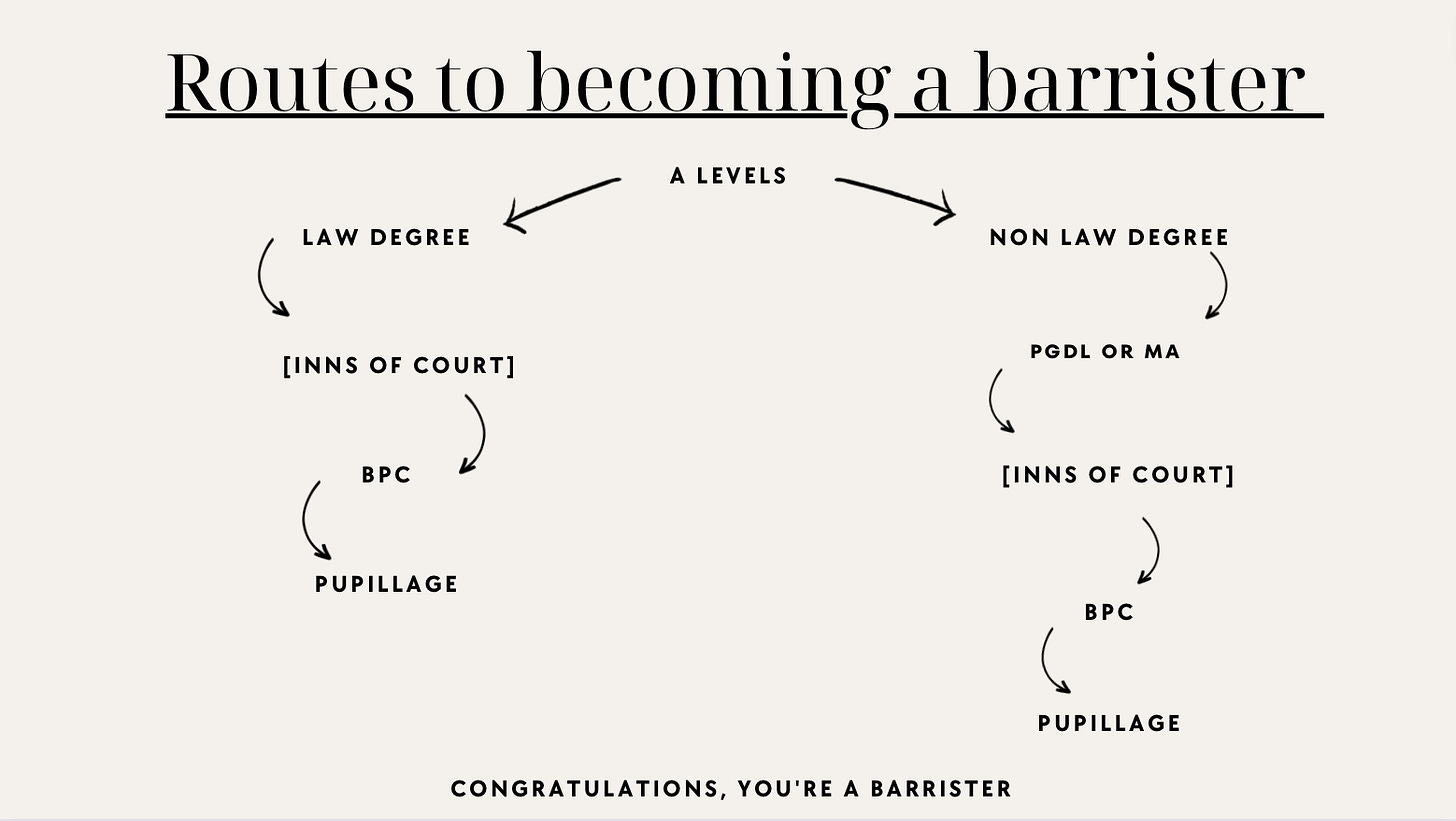The legal pathway has nearly come to an end sigh, but don’t worry, we won’t be leaving without discussing the process regarding how to become a barrister. Now, what is the difference between a barrister and a solicitor? Well, you are correct in thinking that they are both lawyers, but they do have differing roles.
A barrister mainly defends people in court, speaking on behalf of their client and advising them. On the other hand, a solicitor advises their clients usually in a law firm. They usually handle the paperwork and help provide solutions to client’s problems.
Barristers are usually hired by solicitors to represent their clients in court. While there are occasions where a solicitor may represent their client in the lower courts, the necessary qualifications are still required for them to have the authority to represent clients in higher courts or the Court of Appeal.
To be, or not to be? The barrister edition
As previously stated, there are so many different career paths available within the legal industry. Make sure you do your research as not all pathways require specific qualifications. Get some work experience in each field. Apply for insight schemes with law firms and join debating societies. This will not only help you understand what the job of a barrister entails, but also what the other jobs within the legal industry involve.
So if you’re a confident speaker, have the ability to express arguments and analyse situations on the spot, this may be the perfect pathway for you! If you have decided that the barrister route is perfect for you, that’s amazing, but remember, becoming a barrister in the UK is no joke! Just like the process of becoming a solicitor, it may take several years before you are fully registered. It will be challenging, but rewarding too. Along the way, you’ll make friends, learn new skills, and have loads of fun. So, embrace the journey and don’t forget to enjoy the ride!
Let’s go down the barrister lane
Unlike the solicitor’s pathway, the route to becoming a barrister is not as complex. Before you continue reading, have a look at the graph I’ve created below. This will enable you to have a better understanding of the different steps required to become a barrister.
Down the pathway we go
Law degree/ Non law degree
As with becoming a solicitor, a law degree can be extremely useful! Undergraduate law degrees can be studied as either an LLB (Bachelor of Law) or BA (Bachelor of Arts). However, the LLB is the more traditional route, as it is considered a qualifying law degree, whereas a BA is not. Therefore, if you have a BA degree, you will need to also complete a conversion course called the PGDL (check out our ‘let’s talk legal: becoming a solicitor’ blog for more information on the PDGL). Essentially, with a BA, you can also study modules that are outside of legal field. This is beneficial for those who would like to explore other subjects alongside law. However, if you want to focus solely on studying law, the LLB option is best for you.
If you do not have a law degree, that’s okay! You can still become a barrister. The doors to becoming a barrister are always open. Once you have completed your degree of choice, you must then complete the PGDL or a Masters in Law (MA). Only then can you move on to studying for the BTC.
Bar Training Course (BTC)
Once you have your degree, it is time to start the BTC. But first, you will need to join one of the four Inns of Court in order to start your BTC. Make sure you do your research to discover which one is best for you. The four options are:
1. Gray’s Inn
2. The Inner Temple
3. Lincoln’s Inn
4. Middle Temple
Now that you’re part of one of the four Inns of Court, you can now move on to the BTC which can be studied both full and part time. The BTC aims to enhance your skills and boost your confidence preparing you for your future career as a barrister. During the course, you will focus on essential advocacy skills, ethics and professional conducts along with studying the core areas such as legal research and dispute skills.
Pupillage
Once you have completed the BTC, you will then be ‘called to the bar’ by your Inns of court to celebrate. In other words, you’re celebrating your graduation. You can then begin your pupillage as an unregistered barrister.
The pupillage is period of training typically carried out in chambers under the supervision of an experienced barrister. The pupillage usually lasts a year and is divided into two periods known as the ‘sixes’: six months of a non-practising period and six months a practicing.
The first six months consists of shadowing your barrister, receiving guidance and advice and frequent assessments. During the second six month period, you will have the opportunity to be more independent. You will be provided with your own cases allowing you to act as a barrister. This is the perfect time to showcase your knowledge and skills demonstrating that you are the right person for the job.
It is advisable to apply for the pupillage during your undergraduate degree or BTC, as it may take some time before you secure it due to its highly competitive nature.
Let the legal journey begin!
Once you have completed all the required steps discussed above, you are not officially a registered barrister! CONGRATULATIONS! All of your hard work and dedication paid off in the end. Make sure you take some time to celebrate your accomplishments and prepare for the journey ahead of you within your legal career.
Let’s go over some brilliant Albanian barristers in the UK.
1. Brikena Muharremi
Meet Brikena, the first London-based Albanian woman (originally from Kosovo) to become a barrister in the UK. She was called to the bar in 2005 by Lincoln's Inn and is the founder of the British Albanian Lawyers Association (BALA). BALA aims to promote cooperation among British and Albanian lawyers based in the UK, Albania, and Kosovo. Brikena is also a member of the Diaspora Coordination Council of Albania, which seeks to advance the interests of the Albanian diaspora. Now that’s what I call an incredible woman!
Alban Brahimi
Alban came to the UK in the late 1990s with his family from Kosovo. He graduated with a 2:1 in law at the University of Kent and is now a qualified self-employed barrister. Additionally, he serves as the treasurer of BALA, and generally handles a variety of legal cases. He completed the BPTC at BPP University and was called to the bar by the Inner Temple in 2013. Alban also had the opportunity to deliver a talk at the British Embassy in Kosovo, focusing on the work of Kosovars living abroad. How cool is that!
1. Klentiana Mahmutaj
Miss Klentiana has been a barrister for over 15 years at Red Lion Chambers. She was appointed as by the UN Human Rights Council as an Independent Expert on the Expert Mechanism on the Right to Development. Klentiana is also co-founder of the Balkan Arbitration Conference and has advised and negotiated the Albanian government regarding the Zero Draft Treaty on Business and Human Rights. Talk about success!












another banger👏
Great read!!